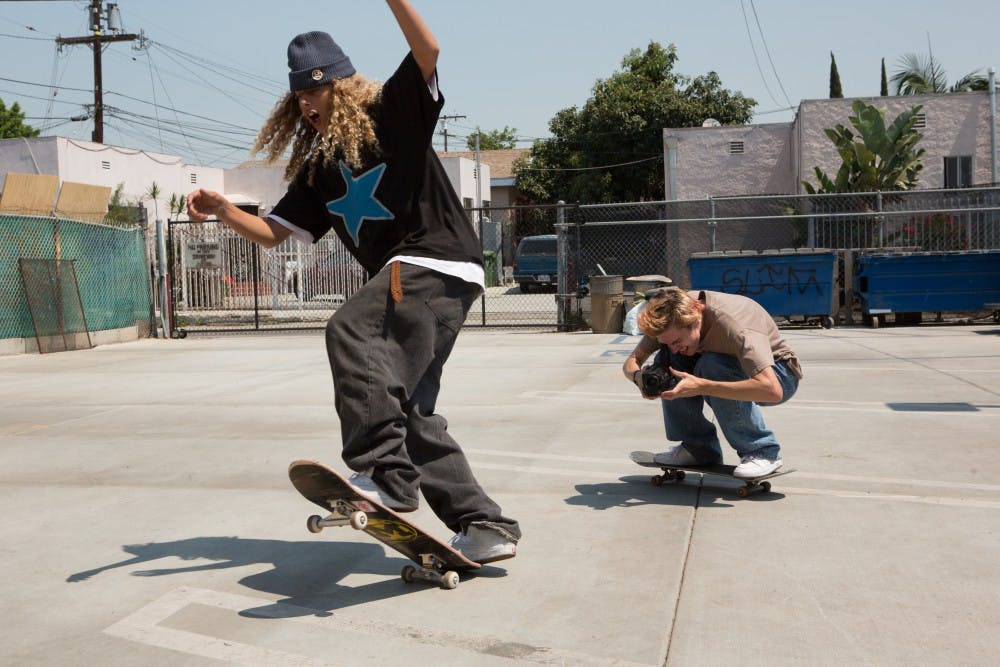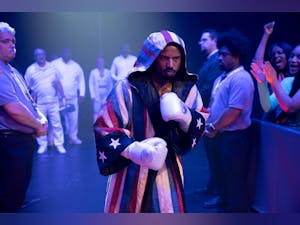From: Silver Screen
“Mid90s” is a unifying throwback film about skating, suffering and striving to be cool

You wouldn’t expect the film to begin with a boy being thrown against a wall, tossed to the floor and then punched multiple times by his older brother. You wouldn’t expect a film about the mid ‘90s, aptly titled “Mid90s,” to show you anything other than the cartoons, burgeoning technologies and baggy pants that were becoming popular in America. You wouldn’t expect comedic actor Jonah Hill to write and direct a film that transcends its setting and becomes more about the people we see than the time that it happens.
“Mid90s” tells the story of a young boy, Stevie (Sunny Suljic), joining a group of adolescent skaters. At home, his mom is absent, more concerned about the next man she is falling for than her two sons’ violent relationship with each other. Stevie’s older brother, Ian (Lucas Hedges) antagonizes and assaults Stevie through physical, verbal and mental abuse.
Stevie’s dismal homelife draws him to the skater group, who “look like gang members,” according to Stevie’s mother. The skaters--comedically named in the film as Fourth Grade, Ruben, Fuckshit and Ray (Na-kel Smith)--go through life with an apathetic outlook; the only thing they do is skate, smoke, drink, watch television and skate some more. But Stevie desperately wants a place to fit in. He adoringly describes the group’s leaders, Ray and Fuckshit, as “cool” time and time again, at one moment saying that Stevie doesn’t think he could ever be like them.
“Mid90s” is not a coming-of-age story. It’s a glimpse of the familiar emotion any audience member might have felt growing up, either in the middle of the ‘90s or in the middle of this decade. When you’re young, fitting in is so important. When you feel like you are not at home in your own house, you turn to the people who give you a home, whether it’s actually “good for you” or not.
The skaters in the film describe skating in different ways: for Ray, it’s a “way out,” an escape from where he’s grown up; for Fourth Grade, skating is an outlet for filming; for Ruben, he can be away from his abusive mother for as long as possible; for Stevie, who becomes nicknamed Sunburn, it’s a way to make friends and feel some kind of belonging, recognition and love; for Fuckshit, skating is just fun.
In a more powerful, lasting scene of the film, Ray, who becomes Stevie’s most positive role model, consoles Stevie when he says, “A lot of the time, we feel like our lives are the worst, but I think if you looked in somebody else’s closet, you wouldn’t trade your sh*t for their sh*t.” Everyone is going through a hard time, but they continue living because they have something that allows them to keep living, despite hard times. Everyone is going through a hard time, but they keep skating.
We are connected by our suffering. This isn’t a reassuring sentiment: why do we have to suffer anyways? Since this question can’t really be answered, “Mid90s” instead offers a heartwarming solution. While you suffer, along with everyone else, do the best thing for yourself that reminds you to keep living. Find people to help you along the way.
The film shows that there are good ways and bad ways to do this, and even while you begin to feel accepted, things can still go wrong. Through minor redemption arcs that could be developed more completely, and a hazy resolution that left the audience sitting in silence for a few moments before reacting, “Mid90s” tells you that none of this is easy. It wasn’t easy then, and it’s not easier now. The story is familiar for any audience member who grew up watching Ren and Stimpy or Spongebob Squarepants.
If you can stomach the over-usage of then-acceptable slurs from riotous teen boys, then this movie will show you its take on how much we privilege fitting in, even if we don’t know what that means. Ray tells Stevie, “You take more hits than anyone I’ve ever met. You know you don’t have to do that right?” Don’t jeopardize yourself to be accepted; living is hard enough, why make it harder?
Hill shows off this universality with sparse, eye-catching and symmetrical shots. He rarely uses his framing to focus on a character, but there’s one distinct moment that nearly stops the rolling, gliding, fast-paced formula of the film. There are beautiful moments like that one, which can’t be spoiled, that slow down the film, pulls the viewer away from the questionable and unpredictable behavior of the characters, and pushes the cinematography beyond the vintage, home-movie visual appeal.
Hill has a lot to say about growing up, fitting in and living with suffering in “Mid90s.” There is so much familiarity, coupled with moments that throw you off and jolt you in your seat. Slowly, each character unfolds while living in the middle ground of liking them and not knowing them at all. The art style throws you back into the world of discmans, VHS tapes and R&B. It’s a joy watching the seamless relationships between Stevie and Ray and the rest of the skaters. The music is a great accompaniment, whether it’s old school rap, a slow-paced score or skateboards grinding on cracked pavement.
“Mid90s” will take you out and back, away from the suffering you have, to remind you where to go if you don’t think you can take it anymore. No one can, but there’s solace in that.
A-
“Mid90s” will be released in DC on Friday, October 26




